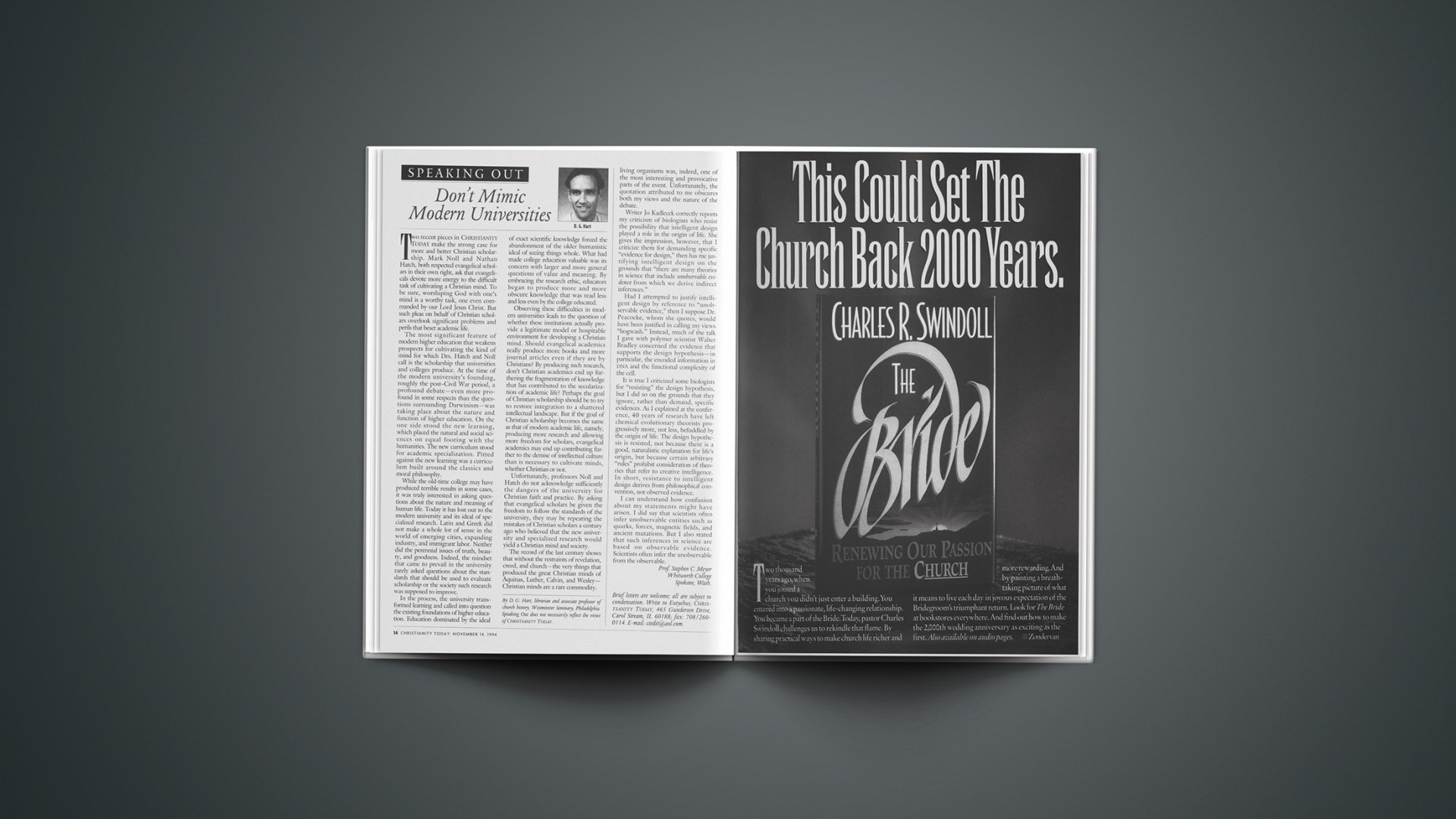Two recent pieces in CHRISTIANITY TODAY make the strong case for more and better Christian scholarship. Mark Noll and Nathan Hatch, both respected evangelical scholars in their own right, ask that evangelicals devote more energy to the difficult task of cultivating a Christian mind. To be sure, worshiping God with one's mind is a worthy task, one even commanded by our Lord Jesus Christ. But such pleas on behalf of Christian scholars overlook significant problems and perils that beset academic life.
The most significant feature of modern higher education that weakens prospects for cultivating the kind of mind for which Drs. Hatch and Noll call is the scholarship that universities and colleges produce. At the time of the modern university's founding, roughly the post-Civil War period, a profound debate-even more profound in some respects than the questions surrounding Darwinism-was taking place about the nature and function of higher education. On the one side stood the new learning, which placed the natural and social sciences on equal footing with the humanities. The new curriculum stood for academic specialization. Pitted against the new learning was a curriculum built around the classics and moral philosophy.
While the old-time college may have produced terrible results in some cases, it was truly interested in asking questions about the nature and meaning of human life. Today it has lost out to the modern university and its ideal of specialized research. Latin and Greek did not make a whole lot of sense in the world of emerging cities, expanding industry, and immigrant labor. Neither did the perennial issues of truth, beauty, and goodness. Indeed, the mindset that came to prevail in the university rarely asked questions about the standards that should be used to evaluate scholarship or the society such research was supposed to improve.
In the process, the university transformed learning and called into question the existing foundations of higher education. Education dominated by the ideal of exact scientific knowledge forced the abandonment of the older humanistic ideal of seeing things whole. What had made college education valuable was its concern with larger and more general questions of value and meaning. By embracing the research ethic, educators began to produce more and more obscure knowledge that was read less and less even by the college educated.
Observing these difficulties in modern universities leads to the question of whether these institutions actually provide a legitimate model or hospitable environment for developing a Christian mind. Should evangelical academics really produce more books and more journal articles even if they are by Christians? By producing such research, don't Christian academics end up furthering the fragmentation of knowledge that has contributed to the secularization of academic life? Perhaps the goal of Christian scholarship should be to try to restore integration to a shattered intellectual landscape. But if the goal of Christian scholarship becomes the same as that of modern academic life, namely, producing more research and allowing more freedom for scholars, evangelical academics may end up contributing further to the demise of intellectual culture than is necessary to cultivate minds, whether Christian or not.
Unfortunately, professors Noll and Hatch do not acknowledge sufficiently the dangers of the university for Christian faith and practice. By asking that evangelical scholars be given the freedom to follow the standards of the university, they may be repeating the mistakes of Christian scholars a century ago who believed that the new university and specialized research would yield a Christian mind and society.
The record of the last century shows that without the restraints of revelation, creed, and church-the very things that produced the great Christian minds of Aquinas, Luther, Calvin, and Wesley-Christian minds are a rare commodity.
D. G. Hart is librarian and associate professor of church history, Westminster Seminary, Philadelphia.
Speaking Out does not necessarily reflect the views of Christianity Today.
Copyright © 1994 Christianity Today. Click for reprint information.










